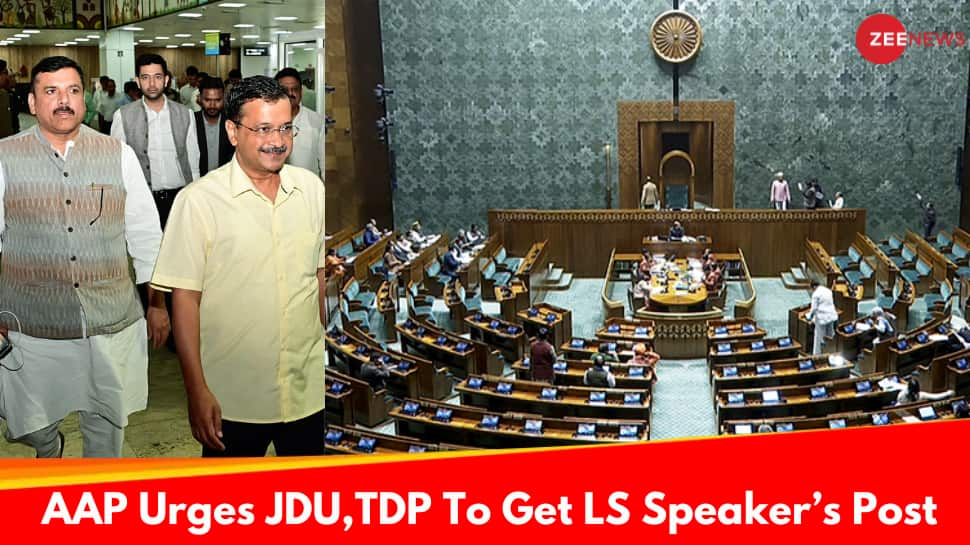The Aam Aadmi Party (AAP) said on Monday that it would be in the best interests of the Constitution and democracy if the ruling NDA's allies, the TDP and JD(U), made sure the Speaker of the Lok Sabha comes from one of the two parties. Rajya Sabha MP for the Aam Aadmi Party (AAP), Sanjay Singh, stated at a press conference that if the Telugu Desham Party (TDP) nominates a candidate for the Lok Sabha Speaker position without the backing of the BJP, the opposition INDIA bloc will be of great importance.
According to Singh, the BJP retained all of the key ministries for itself and awarded its National Democratic Alliance (NDA) allies "jhunjhuna," (less significant ministries). "I will encourage parties such as the Janta Dal (United) and the TDP to at least have a Speaker from your party. "This will be beneficial to your party, the Constitution, and democracy," he added. The INDIA bloc should consider the possibility of the TDP fielding a candidate for Lok Sabha Speaker, Singh said.
"If the TDP fields its candidate, the role of INDIA constituents, including the Congress, will be very crucial," he added.
When the 18th Lok Sabha meets for the first time, the Protem Speaker will administer the oath to the new MPs, followed by the election of the new Speaker. Let’s understand why the position of the Lok Sabha Speaker is so important, what powers the Speaker holds, and why this position is crucial for both the ruling party and the opposition.
Position Of Lok Sabha Speaker In The Constitution
India follows a parliamentary democracy, and the Constitution provides for the positions of Speaker and Deputy Speaker. According to Article 93, both positions should be filled “as soon as may be” after the House’s first meeting. The Speaker of the Lok Sabha is elected by a simple majority. The term of the Speaker and Deputy Speaker ends with the term of the Lok Sabha. They can also be removed before their term ends through impeachment, as provided in Article 94 of the Constitution.
Like any other member of the Lok Sabha, the Speaker can also be disqualified. There are no specific qualifications required to become the Lok Sabha Speaker, meaning any MP can be elected to this position.
Role And Powers Of The Lok Sabha Speaker
The position of the Lok Sabha Speaker is distinct from other members. The Speaker’s chair is unique, and the responsibility of ensuring the smooth functioning of the House lies with the Speaker. The Speaker’s opinion is crucial in matters of disqualification of members. If there is a tie in votes on any bill, the Speaker’s vote becomes decisive.
Salary Of The Lok Sabha Speaker
The salary of the Lok Sabha Speaker is drawn from the Consolidated Fund of India, while the salaries of other MPs are based on laws passed by the House.
Powers Of The Lok Sabha Speaker
House Proceedings: From the Speaker’s chair, the entire House is visible. The Speaker, in consultation with the Leader of the House, decides the schedule of the House. Permission from the Speaker is mandatory before raising any question or issue in the Lok Sabha. Although there are rules for the proceedings of the House, it is the Speaker’s responsibility to ensure their adherence. Thus, the Speaker’s impartial role is crucial for democracy.
The Speaker decides which questions will be asked in the Lok Sabha. The Speaker also determines how the records of the House proceedings will be kept and what should be removed from them. The Speaker can declare any statement or part of it as unparliamentary and remove it from the proceedings. When the ruling party has fewer seats, the Speaker can ignore requests for a division of votes and pass bills by voice vote.
No-Confidence Motion: The Speaker’s impartiality is tested when a no-confidence motion is brought against the government. In 2018, when YSRCP and TDP gave notice for a no-confidence motion, then-Speaker Sumitra Mahajan adjourned the House several times before accepting the motion and putting it to vote.
Casting Vote: The Speaker has the power to cast a decisive vote. According to Article 100, the Chairman of the Rajya Sabha or the Speaker of the Lok Sabha, or any person acting in that capacity, “shall not vote in the first instance, but shall have and exercise a casting vote in the case of an equality of votes.” Generally, the Speaker votes in favor of the government.
Powers Related To Disqualification Of Members
Under the Tenth Schedule of the Constitution, the Speaker has significant powers. The Tenth Schedule, or the anti-defection law, introduced through the 50th (Amendment) Act, 1985, gives the Speaker the power to disqualify legislators who defect from their party. In a landmark case in 1992, the Supreme Court upheld the Speaker’s power and stated that only the final order of the Speaker would be subject to judicial review.
Defection can change the numbers game in the House and potentially topple the government. If the Speaker acts promptly and disqualifies such members, the new government may not have a majority. However, delays in deciding disqualification petitions can affect the Tenth Schedule.
In 2023, the Supreme Court directed Maharashtra Assembly Speaker Rahul Narwekar to expedite the disqualification proceedings against the MLAs of the Uddhav Thackeray and Eknath Shinde factions of the Shiv Sena. At that time, the petitions had been pending for over a year and a half, leading to the fall of the Uddhav-led government. In 2020, the Supreme Court ruled that Speakers of Assemblies and the Lok Sabha should decide on disqualification petitions within three months, except in extraordinary circumstances.
















